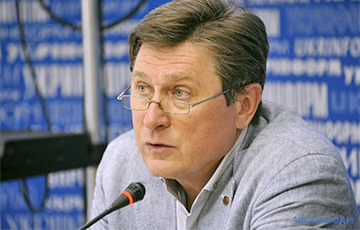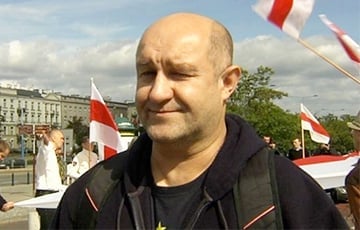Volodymyr Fesenko: This Is Negotiating Trap
35- 18.02.2025, 17:47
- 40,812

Ukraine will refuse to sign documents that will contradict its interests.
Negotiations between the US and Russian delegations took place in Saudi Arabia.
Charter97.org asked the famous Ukrainian political scientist, head of the Penta Center for Applied Political Research Volodymyr Fesenko to comment on the meeting in Riyadh:
— One simple thing must be understood — these are not negotiations on ending the war in Ukraine. Yes, this topic was also discussed there, but the main goal of the meeting in Riyadh was to prepare for a personal meeting between the presidents of the US and Russia.
Indeed, the agenda was discussed, contentious issues between the US and Russia regarding how both sides see the end of the war between Russia and Ukraine, contentious issues regarding the logic of the peace process. As I understand it, it is still necessary to agree on direct negotiations between Russia and Ukraine. The peacekeepers' questions, the Russians are already reacting to this quite nervously and aggressively, regarding Europe's participation in the negotiations and so on.
A preparatory meeting has taken place. It is necessary to keep in mind what, unfortunately, many commentators do not take into account. The fact is that Trump has launched two parallel negotiating tracks since the end of January (and maybe even earlier, before the inauguration).
One negotiating track with Ukraine, the second — with the Russians. Until recently, the negotiations with the Russians were held in a closed mode, unofficially, we knew nothing about them. Both sides confirmed them (both the Americans and the Russians), but who participated in them, what they talked about — we did not know.
Now these negotiations have moved to the official plane. In particular, the meeting in Riyadh.
Negotiations with Ukraine are also officially underway, it is known who is participating in them from both sides, a high-level meeting has already taken place in Munich. A meeting of the American delegation headed by the US Vice President and the Ukrainian delegation headed by President Volodymyr Zelensky. There are also already telephone contacts with the American side, and General Keith Kellogg is expected to visit Ukraine on February 20.
I will note that Trump has defined different compositions of the delegations. This shows his specific approach to the negotiations. In Munich, Keith Kellogg explained that there was a division of functions. He will be responsible for negotiations with Kyiv and the Europeans, and Steven Witkoff (another special representative of Trump) will be responsible for negotiations with Moscow.
— Why did Trump decide to make such a division?
— Kellogg explained that it was for speed. He lives by Trump's time. Trump is very temperamental (in this he and Zelensky are similar) and wants the negotiation process to develop faster, there was no lengthy shuttle diplomacy, when one negotiator goes to Kyiv, then to Moscow.
Next week, General Keith Kellogg will gather in the Oval Office those who are negotiating with Russia and Ukraine. They will develop a further algorithm of actions.
This is approximately the logic of the negotiation process in the United States. Now these are parallel negotiations, and after Trump's meeting with Putin, I think that the question of when and how direct negotiations between Russia and Ukraine should begin with the moderation of the United States will be decided.
— How will Trump act if he understands that Putin's main goal is to drag out the negotiations and fail them, and not to come to a quick solution?
— There are contradictions in the approaches to the peace process between the United States and Russia. The United States wants a ceasefire first, and then peace negotiations. Putin believes that it is necessary to immediately agree on a large peace treaty. At the same time, I think that Putin will not stop military actions. And this is where a problem arises for Trump. In my opinion, this is an illusion, but Trump believes that Putin wants to end the war. Zelensky thought the same in 2019, but it turned out that, unfortunately, this is not the case.
I think that the US President will face the same problem. He will see that Putin does not want the war to end. He wants to use the war to put pressure on the negotiation process. How will Trump react to this? Let's see. There is no answer to this question yet.
But what happened today in Riyadh is the preparation for a meeting between Trump and Putin, and the beginning of official negotiations.
These negotiations will concern not only the war between the countries, but also bilateral relations between the US and Russia.
These are security issues, because a number of agreements are hanging (on strategic offensive weapons, on medium-range missiles, etc.), and this also needs to be agreed upon.
I will also say why Dmitriev (head of the Russian Direct Investment Fund Kirill Dmitriev — edit.) is taking part in the negotiations. The Russians want to hook Trump on a business hook. They want to tempt him with lucrative business offers.
They realized that Trump is attracted by business interests, they are more appealing to him than security, international politics, and so on. They want to offer him such a “bait”. This is a negotiating trap.
We'll see whether it works or not. Zelensky also wanted to use the same tactics against Trump, but it turned out that Trump is a very cunning negotiator. In response, he offered Ukraine a draft agreement that did not correspond to our interests.
Therefore, the Ukrainian side refused to sign the American draft, negotiations are ongoing, but Ukraine has shown that we will not sign any documents that are developed without our participation.
This is very important. This is a signal that also concerns future peace negotiations. Therefore, thinking that tomorrow Trump and Putin will agree on something and present us with a fait accompli... It will not work!
I emphasize that Ukraine has already shown that we will not sign something in which we did not participate. Yes, in our case, Trump wanted to present us with a fait accompli, but the same can happen with the Russians.
The Russians are offering him their terms, and Trump can offer his. It is too early to draw conclusions. Some clarity on the further prospects of the negotiation process will most likely appear after the meeting between Trump and Putin.











